Recording
In July 1973, Van Zandt performed a string of shows over five sweltering nights at the Old Quarter bar owned by Rex ("Wrecks") Bell and Dale Soffar that were recorded on a portable four-track by Earl Willis, the album's producer and engineer. They would eventually be released four years later by Van Zandt's previous producer and manager Kevin Eggers on his new Tomato Records label. The liner notes describe the recording as the "Rosetta Stone" of Texas music. One can hear Van Zandt's influences in covers by artists like Bo Diddley, Texas bluesman Lightnin' Hopkins, and country picker Merle Travis. Van Zandt's most famous works can also be heard, such as "If I Needed You" and "Pancho and Lefty" played to an audience not already familiar with these songs. The singer's laconic banter and corny jokes are also on full display. The album is also noted for the intimacy of the performance, with Van Zandt taking the stage alone and accompanying himself on guitar as he did thousands of times during his career. In the 2007 biography To Live's To Fly: The Ballad of the Late, Great Townes Van Zandt, John Kruth writes that Van Zandt played "to nearly a hundred folks per set, packed shoulder to shoulder within the bar's bare brick walls. The room was so jammed that it was impossible for a waitress to wend her way through the crowd to take drink orders. People had to pass money hand over fist and wait, in hopes that a mug of cold beer would eventually find its way back to them." Van Zandt is introduced by Dale Soffar and, after apologizing for the busted air conditioning, performs a gentle reading of "Pancho and Lefty", describing how he wrote the song while traveling near Dallas with Daniel Antopolsky. At the end of the song, the singer remarks, "I've never heard it so quiet in here." The photograph on the album cover was shot by Steve Salmieri.
Release and reception
The release of Live at the Old Quarter, Houston, Texas in 1977 followed a period of relative inactivity for Van Zandt, whose last album, The Late Great Townes Van Zandt was released in 1972. Van Zandt had recorded a follow-up with the working title 7 Come 11, but its release was held up due to a dispute between producer Jack Clement and Poppy Records founder Kevin Eggers. When the live album finally came out it received euphoric praise from critics, who had bemoaned the overproduction on some of his earlier records. Sean Mitchell of the Dallas Times Herald commented, "Though this gifted songwriter has been a legend in and around the folk circuit of the Southwest for a decade, his albums have been harder to find than El Dorado." The LA Times hailed Van Zandt as "a cross between Woody Guthrie and Leonard Cohen." AllMusic writes that Van Zandt "could work magic in front of an audience under the right circumstances, and while a wealth of live recordings of Van Zandt have emerged since his passing on the first day of 1997, Live at the Old Quarter, Houston, Texas ranks with the very best of his concert albums." Amazon.com opines, "It's not just his best live album, but maybe his best album, period." Chris Robinson of the Black Crowes told Van Zandt biographer John Kruth that he'd been given a copy of the album by Mark Olson of the Jayhawks and that the record "really spoke to me. I listened to it constantly while on a tour of Europe. In rock and roll people tend to forget about the importance of songwriting. Townes really inspired me to become a better songwriter. That motherfucker had his antennas up."
Van Zandt remained cautiously optimistic about his critical windfall, stating in a 1977 interview with Omaha Rainbow, "I kind of forgot all about them. Then Kevin Eggers took the tapes to a studio at Lima, Ohio, and came out with the record. It's okay. That's what went down and it's good to have. Getting that record out on Tomato meant to me that all the mire that the business end of my career got wedged into was finally evaporating. I was out of the chute on a brand new horse, right?"

Pancho & Lefty by Townes Van Zandt (1972) became well-known through a honky tonk album by outlaw country musicians Merle Haggard and Willie Nelson, released in 1983. Original vinyl copies from 1983 give the album's title as "Poncho & Lefty" on the cover, as well as on the inner sleeve and the record label; the album's title track is similarly rendered "Poncho & Lefty" on the cover, inner sleeve, and label. Later editions correct the title to the intended "Pancho & Lefty.” They are backed by Don Markham of The Strangers.

John Townes Van Zandt was an American singer-songwriter. He wrote numerous songs, such as "Pancho and Lefty", "For the Sake of the Song", "If I Needed You", "Snake Mountain Blues", "Our Mother the Mountain", "Waitin' Round to Die", and "To Live Is to Fly". His musical style has often been described as melancholic and features rich, poetic lyrics. During his early years, Van Zandt was respected for his guitar playing and fingerpicking ability.

Samuel John "Lightnin'" Hopkins was an American country blues singer, songwriter, guitarist and occasional pianist from Centerville, Texas. In 2010, Rolling Stone magazine ranked him No. 71 on its list of the 100 greatest guitarists of all time.
"Pancho and Lefty", originally "Poncho and Lefty", is a song written by American country music singer-songwriter Townes Van Zandt. Perhaps his most well-known song, Van Zandt recorded his original version of this song for his 1972 album The Late Great Townes Van Zandt. The song has been recorded by several artists since its composition and performance by Van Zandt, with the Willie Nelson and Merle Haggard version selling the most copies and reaching number one on the Billboard country chart. In 2021, the Townes Van Zandt version was ranked number 498 on Rolling Stone's 500 Greatest Albums of All Time.

The Late Great Townes Van Zandt is a 1972 studio album by American singer-songwriter Townes Van Zandt. It was the second album that he recorded in 1972, and a follow-up to High, Low and In Between.
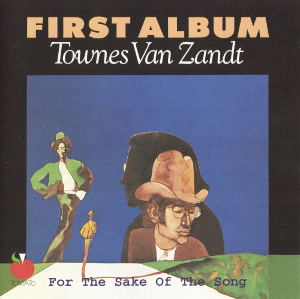
For the Sake of the Song is the debut album by country singer/songwriter Townes Van Zandt, released in 1968. The majority of the songs, including the title track, "Tecumseh Valley", "(Quicksilver Daydreams of) Maria", "Waitin' Around to Die", and "Sad Cinderella", were re-recorded in more stripped-down versions for subsequent studio albums.

Our Mother the Mountain is the second album by country singer/songwriter Townes Van Zandt, released in 1969. It is considered to be one of his greatest recordings and features some of his best known works, including "Be Here To Love Me", "Snake Mountain Blues" and "Our Mother The Mountain".
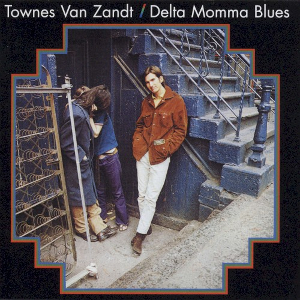
Delta Momma Blues is the fourth album by the country singer/songwriter Townes Van Zandt, released in 1971. Unlike his previous albums, which were influenced by Appalachian folk and country music and recorded in Nashville, this album was blues influenced and recorded in New York City.
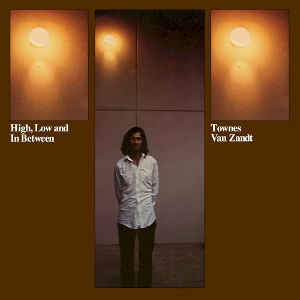
High, Low and In Between is an album by country singer/songwriter Townes Van Zandt, released in 1971. The album was recorded in L.A. and showcases what Van Zandt himself considered to be one of his most well written songs: "To Live Is To Fly".

Together at the Bluebird Café is a live recording of an "in-the-round" concert by three critically acclaimed Texan singer-songwriters, Steve Earle, Townes Van Zandt and Guy Clark. Each alternates between solo performances.

Flyin' Shoes is an album by the American musician Townes Van Zandt, released in 1978. It was his first album of original material in five years and was produced by Chips Moman.

At My Window is an album released by folk/country singer-songwriter Townes Van Zandt in 1987. This was Van Zandt's first studio album in the nine years that followed 1978's Flyin' Shoes, and his only studio album recorded in the 1980s.

Roadsongs is a live album of cover songs released by folk/country singer–songwriter Townes Van Zandt in 1994.
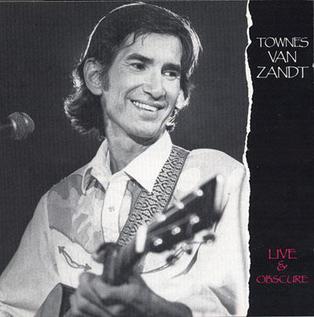
Live and Obscure is a live album released by folk/country singer-songwriter Townes Van Zandt in 1987. It was recorded at Twelfth and Porter in Nashville, Tennessee in April 1985.
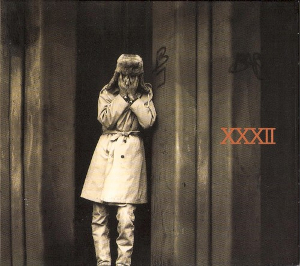
Live at McCabe's is a live album released by singer-songwriter Townes Van Zandt in 1995. It was recorded at McCabe's Guitar Shop in Santa Monica, California and is a limited edition. Only 2000 copies were printed.

The Nashville Sessions is an album by American singer/songwriter Townes Van Zandt, recorded in 1973 but not released until 1993. The tracks were originally recorded for what would have been Van Zandt's seventh album, but was not released until twenty years later due to a dispute between producer Jack Clement and Poppy Records founder Kevin Eggers.
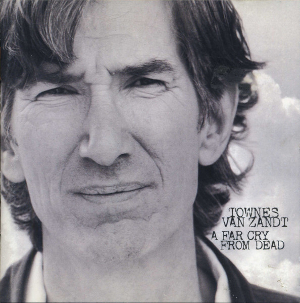
A Far Cry from Dead is a posthumous album by Townes Van Zandt, released two years after the singer's 1997 death. It contains overdubbed instrumentation added to vocal and guitar recordings made by the late singer. It was Van Zandt's first album on a major label.

Sunshine Boy: The Unheard Studio Sessions & Demos 1971–1972 is an album by Townes Van Zandt. It was released posthumously in 2013.

Sky Blue is a posthumous album by Texas singer and songwriter Townes Van Zandt, recorded in 1973 but not released until 2019. All tracks were recorded in early 1973 at the Atlanta, Georgia, home studio of Bill Hedgepeth, a journalist, musician, and longtime friend of Van Zandt. Its 2019 release was conceived by Townes' surviving family—his wife and literary executor Jeanene, along with his children, J.T., Will, and Katie Bell.
Old Quarter Acoustic Cafe is a music "Listening Room" in Galveston, Texas founded by Rex "Wrecks" Bell. Originally a bar Old Quarter, it was opened in Houston, Texas in 1965 by Rex Bell and Cecil Slayton. The Old Quarter is most well-known as the venue for Townes Van Zandt live album Live at the Old Quarter, Houston, Texas. The song Rex's Blues from the album was written about Rex Bell whom Van Zandt remarked upon during the recorded live performance. The reopened Old Quarter Acoustic Cafe in Galveston, Texas features recurring "open mic" acoustic music performances.
















